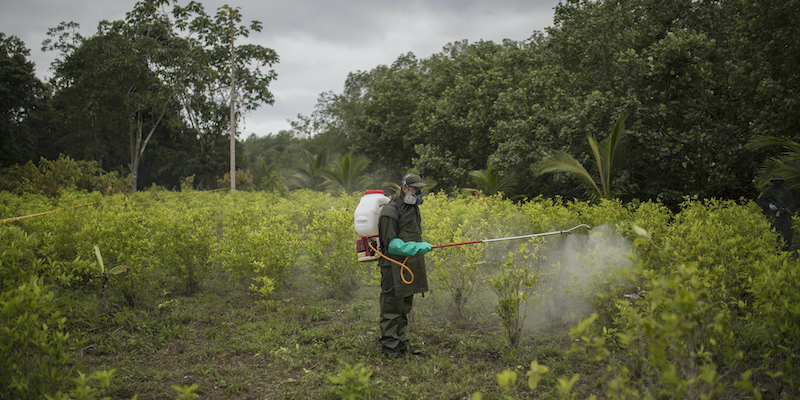US President Joe Biden last week has canceled the sentences of more than 6 thousand people convicted of the federal crime of possession of marijuana. Biden motivated this decision by saying that he didn’t make sense that so many people were in jail for that reason, especially since cannabis is now legal in 19 US states. Taking a cue from this news, theEconomistone of the most prestigious magazines in the United Kingdom that for years has been campaigning for the legalization of cannabis in a section called “Legalize it”, has published an editorial titled “Biden is too fearful. It is time to legalize cocaine ”.
In recent years, the debate on the issue – especially that on decriminalization and legalization of so-called “soft” drugs, such as cannabis – has become increasingly lively and many countries have adopted alternative measures to the prohibitionist approach that seemed the only one from the 1970s. possible. The proposal ofEconomist however, it is still quite daring, since the idea of legalizing a drug considered “heavy” as cocaine is still considered by many to be extreme and unrealistic, in the United States as well as in most countries of the world.
The first argument that mentions theEconomist in support of his thesis it is known: the so-called “war on drugs” started by former US president Richard Nixon more than fifty years ago has never brought the desired results. Indeed, the belief that it was a failure is increasingly widespread: the amount of cocaine arriving in the United States from other countries has only increased and so has the number of drugs available in the country. Over the past two decades, US governments have made all sorts of attempts to stop cocaine production in South American countries – which are the main exporters – but it has never declined, if it ever moved elsewhere.
L’Economist also recalls that the countries that produce and export cocaine are the countries where crime and violence are the highest: the number of murders in Colombia is three times higher than in the United States, and the situation is even worse in Mexico. In these countries, the criminal organizations that manage drug trafficking are so rich that they even corrupt the highest organs of the state.
Colombian President Gustavo Petro recently proposed to decriminalize the cultivation of coca leaves (the ones from which the drug is extracted) and allow citizens to consume cocaine safely. Changing the laws in Colombia though, says theEconomistit is useless if the same is not done even in richer countries, such as the United States, which is among the main markets for those who trade it illegally.
L’Economist he also argues that decriminalizing the use of cocaine is not enough, but that in order to change things it is necessary to legalize it. Decriminalization and legalization are often considered synonymous when it comes to drugs, but they are not the same thing. In the first case we mean the elimination of criminal penalties for people who consume illegal drugs, which are replaced with administrative penalties such as fines or the suspension of the driving license. Legalizing a substance, on the other hand, means authorizing its production and trade, as well as its use, within certain limits and in a regulated manner. Legalization involves a major change in the attitude of states towards the substance in question.
Just decriminalizing cocaine would mean, according to theEconomistleave production in the hands of criminal organizations and probably create greater demand (given that the deterrent of criminal sanctions would disappear). “The real answer is full legalization”, reads theEconomist, “Which allows non-criminals to supply a strictly regulated and highly taxed product, just like whiskey and cigarette manufacturers do.” In this situation, the criminal gangs that today smuggle cocaine illegally would lose a large part of their earnings and with them a large part of their power.
A strict regulation of production and sale, among other things, would also reduce the risks associated with consumption: for example, because it would prevent the circulation of “cut” cocaine, that is, mixed with other powders, as it is currently often sold by criminal organizations. In recent years, especially in the United States, deaths related to cocaine use have increased because to sell larger quantities it was stretched with fentanyl, a cheaper opioid and much more harmful to health.
Of course, the legalization of cocaine would also have costs: more people would have access to it, with the risk of developing addiction and having serious damage to health, such as circulatory and heart problems, psychosis and hallucinations.
According to theEconomist however, scientific studies on the effects of cocaine are few and we cannot say with certainty whether or not the addiction it creates is greater than that created by alcohol and tobacco. Surely, concludes theEconomistresources should be used to manage the issue from a health point of view, but they would be inferior to those that governments employ today in the “war” against illegal trafficking. “The benefits – safer cocaine, safer roads and greater political stability in the Americas – far outweigh the costs.”
At the moment there are few politicians willing to pass as permissive on the issue of drugs, but “supporters must continue to insist on this point”.

:strip_icc():format(jpeg)/kly-media-production/medias/1591773/original/098581100_1494573551-Ikan-Salmon4.jpg)
